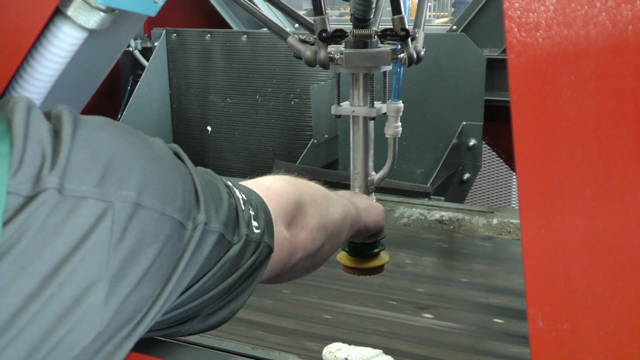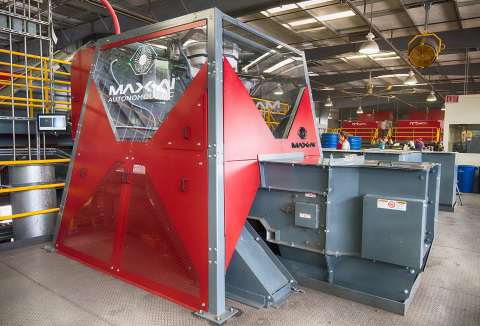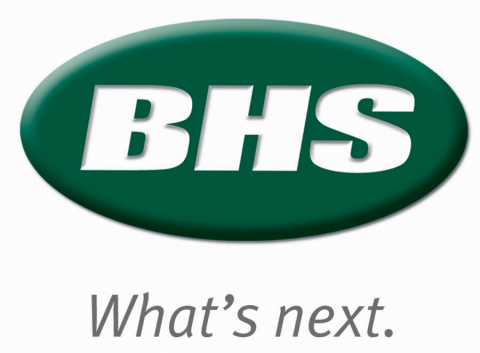EUGENE, Ore. & NASHVILLE, Tenn.--(BUSINESS WIRE)--Bulk Handling Systems (BHS) has announced the arrival of Max-AI™ technology, an artificial intelligence that identifies recyclables and other items for recovery. Through deep learning technology, Max-AI employs both multi-layered neural networks and a vision system to see and identify objects similar to the way a person does. The technology will drive improvements in Material Recovery Facility (MRF) design, operational efficiency, recovery, system optimization, maintenance, and more.
The first available machine utilizing Max-AI technology is an Autonomous Quality Control (QC) unit that sorts container streams following optical sorting. This robotic sorter uses its vision system to see the material, its artificial intelligence to think and identify each item, and a robot to pick targeted items. This system is able to make multiple sorting decisions autonomously, for example separating various materials such as thermoform trays, aluminum, and fiber while removing residue from a stream of PET bottles. All of this is done at rates exceeding human capabilities.
According to BHS Chief Executive Officer Steve Miller, “Labor is a significant challenge for MRF operators and it’s obvious that Max will be very beneficial in helping our customers manage that aspect of their business. However, the highest returns will come from complete integration of Max-AI technology throughout every advanced BHS system. Our customers will not only have autonomous sorting, but also an intelligent central nervous system that observes what’s happening in the plant in real-time and adjusts process parameters to maximize profits.”
The first commercial Autonomous QC unit is already in operation at Athens Services’ Materials Recovery Facility (MRF) in Sun Valley, California. A recipient of the SWANA Award for Excellence in 2016, Athens was an ideal location for the first installation of Max-AI robotic sorters to complement the advanced screen, air, and optical separation technology already in use. Integrating seamlessly with the company’s existing NRT optical sorters, Max provides a fully autonomous PET sorting solution.
“This technology was simply not possible until now,” states Thomas Brooks, BHS Director of Technology Development. “Recent advances in computer processing capabilities have enabled us to develop this groundbreaking machine learning platform. Max is more than just a robotic sorter. Max-AI technology will soon become the active brain of our MRFs, controlling various robotic, optical, and other sorting equipment, providing real-time material composition analysis, and making autonomous decisions.”
Max is central to BHS’ plan to bring autonomous optimization to MRFs over the coming years, increasing performance and profitability. Roy Miller, BHS’ Vice President of Engineering sees this as revolutionary for the recycling industry. “For me, this is the culmination of decades of technological development in recycling. Operating costs will go down while uptime, throughput, recovery and purity will all increase, leading to significant economic benefits for our customers and environmental gains for stakeholders everywhere. This is an exciting time indeed.”
At press time, Max was busy recycling and declined to comment. For more information, visit max-ai.com.
Video Link:
https://youtu.be/Q7tE_vNYzzU
Embed Code:
<iframe width="1280" height="720" src="https://www.youtube.com/embed/Q7tE_vNYzzU"
frameborder="0" allowfullscreen></iframe>
Bulk Handling Systems (BHS)
Headquartered in Eugene, OR, BHS is a worldwide leader in the innovative design, engineering, manufacturing and installation of sorting systems and components for the solid waste, recycling, waste-to-energy, and construction and demolition industries. Wholly-owned subsidiaries include Nihot (Amsterdam), NRT (Nashville, TN) and Zero Waste Energy (Lafayette, CA). Clients around the globe choose BHS because of its experience, dedication to cutting-edge technology, quality construction and durability, and unmatched customer service. BHS has built some of the largest and most durable MRFs in the world – and they are achieving the highest throughput, recovery, and purity rates in the industry.




